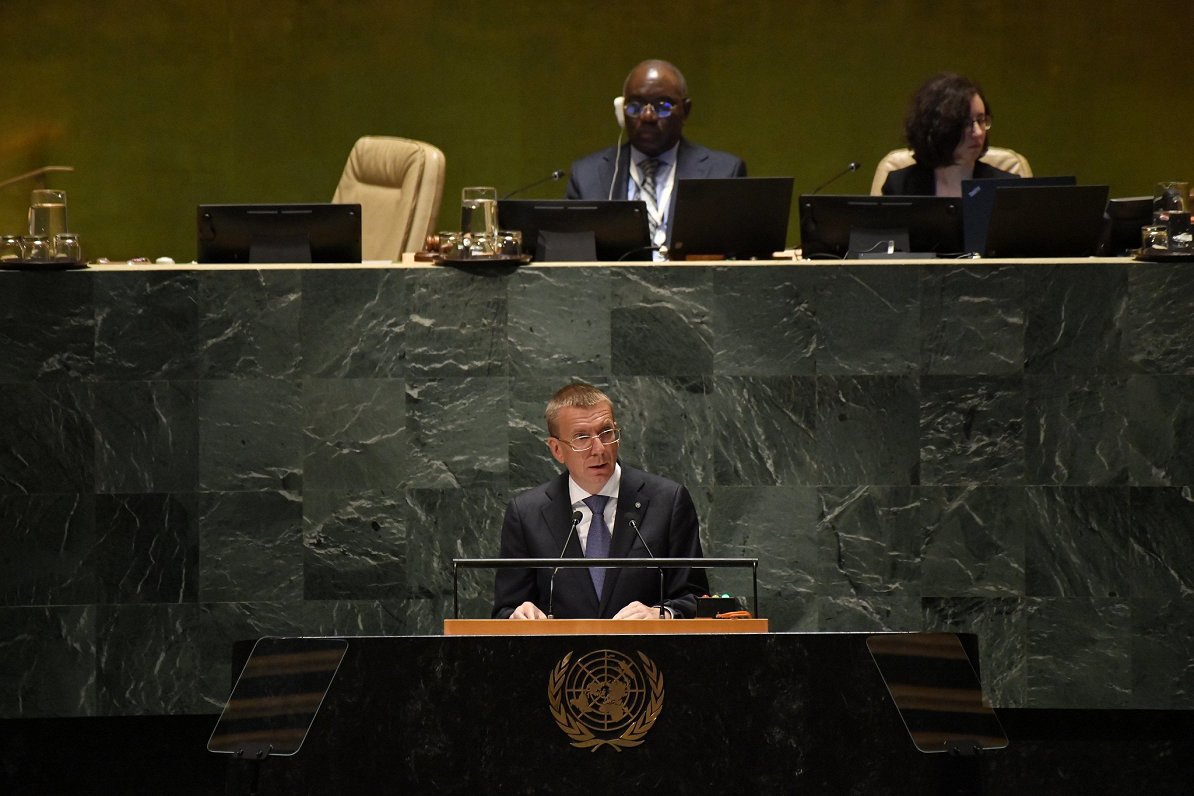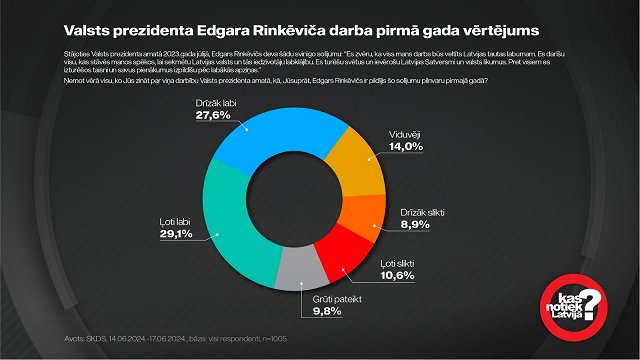The text of Rinkēvičs' speech is reproduced below (minus a few brief introductory niceties), and you can watch how he delivered it in the video above. At the bottom of this page you can also see video footage of Rinkēvičs' contribution to a meeting debating the UN Security Council in which he touched on similar topics.
Today, I would like to highlight the following points.
We are at a transformative moment for the global order. Russia’s unprovoked war of aggression against Ukraine continues to challenge the world in many ways. It is a test for the rules-based multilateral system.
The Russian Federation’s brutal invasion of its neighbor runs counter to the United Nations fundamental principles – to refrain from the use of force against the sovereignty and territorial integrity of states.
A blatant breach of these principles undermines the entire international system. Especially if the aggressor is a nuclear-weapon state and a permanent member of the United Nations Security Council.
It is not a dispute between two neighboring countries. Russia’s attack was unprovoked. Russia is trying to redraw international borders by force to restore its former sphere of influence.
In 2008 and in 2014 international community made a grave mistake by not responding to Russia’s aggression against Georgia and to the illegal annexation of Crimea.
It sent a wrong signal to Russia, allowing its aggressive imperial ambitions to advance. We are now seeing the consequences.
Russia’s invasion of Ukraine is a reminder of the struggle of a colonial empire to keep its territories. Ukraine is not Russia – never was, never will be.
Having experienced fifty years of Soviet occupation, Latvia knows the value of freedom and independence like so many countries in other regions.
The international community must firmly stand together against Russia’s attack on the principles and norms of the international law. Respect for the UN Charter is in the vital interest of all states. The outcome of this war will determine global security for years to come.
Latvia condemns in the strongest possible terms Russia’s ongoing aggression against Ukraine, enabled by Lukashenko’s regime in Belarus.
We cannot talk about restoring international trust, until Russia ends the war and withdraws from Ukraine.
Russia must withdraw all its forces and military equipment from Ukraine within its internationally recognized borders. Russia must stop its terror and atrocity crimes.
In response to those who call for a ceasefire and peaceful dialogue, I wish to remind that only Ukraine can decide when to start negotiations about peace.
Latvia supports Ukraine’s peace formula. Sustainable peace must be based on Ukraine’s sovereignty and territorial integrity. I call on all members of the United Nations to support these principles.
Ukraine has shown remarkable determination in exercising its right to self-defense against Russia’s aggression. I urge international community to continue providing all necessary support to Ukraine and its people.
Latvia will support Ukraine for as long as it takes. Our assistance to Ukraine has already exceeded 1.3 percent of Latvia’s GDP. Together with private sector and civil society, we have sent humanitarian aid to Ukrainian regions. Latvia continues to give safe refuge to Ukrainian people. We provide rehabilitation to wounded Ukrainian soldiers and victims of sexual violence.
Comprehensive support to Ukrainian people to rebuild their country will be required. It is important to lay the ground for the reconstruction of Ukraine already now.
Even in times of war, the rules of the international humanitarian law apply. The evidence of Russia’s deliberate attacks on civilian population and infrastructure in Ukraine is mounting.
Innocent civilians, including children, are killed. More than eleven million people have been forced to leave their homes or flee their country.
Forcible deportations and illegal adoptions of Ukrainian children to Russia are of serious concern. We call on the United Nations to take a more active stand on this issue. Latvia knows all too well the heavy toll deportations and repressions of the occupying regime have brought upon generations.
Russia must bear full legal and financial responsibility for its aggression.
We must ensure complete accountability for all crimes committed in Ukraine. It means responsibility of Russia as a state for violations of international law. And it means individual liability for the most serious international crimes.
I commend the steps taken by the International Criminal Court to investigate atrocity crimes in Ukraine. Latvia has provided financial contributions to ICC, including to the Victim support fund. We support other international mechanisms documenting and investigating Russia’s violations.
However, the International Criminal Court or any other existing mechanism cannot exercise jurisdiction over the crime of aggression against Ukraine. Every effort should be made to hold Russian leadership and military personnel accountable. What is at stake is whether impunity or abiding to international rules of law will prevail.
Latvia reiterates the need to establish Special International Tribunal for the Crime of Aggression against Ukraine. The creation of a tribunal under the auspices of the United Nations would provide the strongest international legitimacy. I encourage other countries to support this proposal.
The Register of Damage created by the Council of Europe is an important step towards a future international compensation mechanism. Currently holding the presidency of the Council of Europe, Latvia has launched the Register. We hope more countries, beyond members of the Council of Europe, will join this important initiative.

By blocking Ukraine’s exports and destroying its agricultural sector, Russia has disrupted grain deliveries worldwide. Yet, it claims to care about global food security.
There is no doubt that Russia is directly responsible for the suffering of the people worldwide.
Increase in costs and food insecurity affects all regions. The Black Sea Grain initiative was paramount for global food security. We condemn Russia’s single-sided termination of this initiative.
Food and energy are instruments in Russia’s warfare, fueled by disinformation. Lies must be countered with truth and facts.
Russia’s invasion of Ukraine that has caused shortage of food and fertilizer supplies, not the sanctions. Sanctions do not block the export of mineral fertilizers and grain from Russia. The inconvenient truth is that Russia is benefitting from higher prices. Access to food is a human right, and hunger must never be used as a political tool.
International efforts to facilitate Ukrainian exports for global food security must continue.
Latvia cooperates with the World Food Programme to improve food security worldwide. I urge the United Nations to resolve the removal of the remaining (Russian-owned) fertilizers from the territory of Latvia, so they can be delivered to the countries in need as soon as possible. The UN system must respond more effectively to humanitarian needs.
The concept of solidarity has defined the work of the United Nations since the birth of the organization.
The Sustainable Development Goals (SDGs) Summit, held two days ago, reaffirmed the importance of dialogue, cooperation, and solidarity.
At the same time, the Summit acknowledged stark reality – the achievement of global goals by 2030 will be very challenging for many countries. International cooperation will be key.
The Global SDGs Index ranks Latvia in the fourteenth place among UN member states for overall achievement of global goals. Latvia is convinced that strengthening of innovative and eco-efficient economy, quality education and good governance will contribute to our development. Participation of the non-governmental sector and youth has become an integral part of our national decision-making processes.
In the spirit of solidarity, Latvia's development cooperation policy is becoming more global. Notable part of our development support has been provided to Ukraine and countries of the European Eastern Partnership and Central Asia. Latvia now extends cooperation projects to countries in Africa. We are willing to contribute to the promotion of peace, good governance, economic growth, digitalization, and gender equality.
Latvia recognizes the climate-induced challenges that Small Island Developing States (SIDS) face. Strengthening resilience remains at the core of SIDS sustainability. Latvia is committed to contribute to successful preparation of the UN SIDS conference next year, including financially.
We will follow an evolving work of the International Law Commission on the legal aspects of the sea-level rise. Moreover, Latvia is already engaged in international legal proceedings addressing the obligations of states regarding climate change.
Resilience against disinformation is an area where Latvia has meaningful experience. We must address accountability of the actors in the information environment also at the global level.
The United Nations is not a perfect institution. Inability to stop the aggression or conflicts has often called this organization’s effectiveness into doubt.
Still, as the only truly global organization, it is the core of multilateral system uniting all sovereign states. It is especially important for smaller countries, like my own country – Latvia.
Revitalization of the UN system and meaningful reforms of the Security Council are necessary. The inability of the Security Council caused by the abuse of the veto is a serious concern. That is why Latvia supports efforts to make the Security Council more transparent and accountable for its inaction. Veto power was not created as a privilege but as a responsibility.
Latvia supports a more just, equitable representation of the regions on the Security Council, including countries from Africa and SIDS.
Latvia remains a responsible and reliable partner. We will continue to be involved in peacekeeping and peacebuilding efforts. Determination to protect the fundamental values of the United Nations Charter guides Latvia’s candidacy for the Security Council elections in 2025.
This organization will be as effective as the collective will of its member states. It is in our hands to safeguard and to improve it.



























